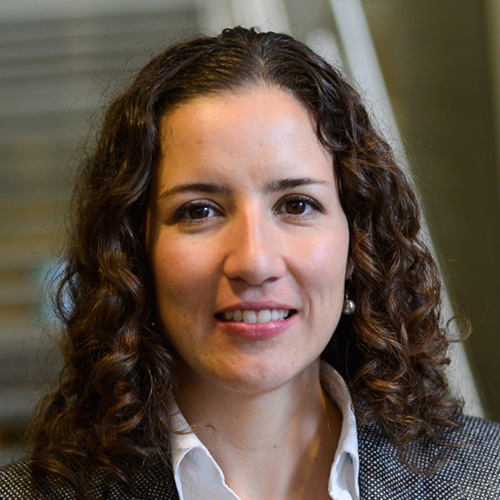Congratulations to Professors Matt Cooper, Lilian Hsiao, Adriana San Miguel and Qingshan Wei!
Professors Matthew Cooper, Lilian Hsiao, Adriana San Miguel and Qingshan Wei have been approved for promotions to the ranks of Full Teaching Professor (Cooper) and Associate Professor with tenure (Hsiao, San Miguel and Wei). The promotions will be effective at the beginning of the fall semester.

Students in Prof. Cooper’s classes know he’s an outstanding teacher. He has received several teaching and engineering-education research awards including NC State’s 2014 Outstanding Teacher Award and the 2019. Alumni Distinguished Undergraduate Professor Award. In 2016, he received the American Society of Engineering Education (ASEE) ChE Division Raymond W. Fahien Award, which is given annually to an educator “who has shown evidence of vision and contribution to chemical engineering education,” and in 2021 he received the ASEE Southeastern Section Outstanding Mid-Career Teaching Award. He’s also an active participant in activities focused on engineering education at the national level.
Prof. Cooper earned his B.S. degree from West Virginia University, and his M.S. and Ph.D. degrees from Ohio University, all in chemical engineering. After having worked in the private sector, he joined our department in 2011.
Matt has served as Chair of the ASEE National ChE Division and he is an ABET program evaluator for chemical engineering programs. In 2022, he was a presenter at two sessions of the ASEE / AIChE Summer School Workshop (for faculty members from across the U.S.).

Prof. Hsiao is considered to be one of the top young researchers in the field of soft matter. Her research expertise is in the area of colloid and surface science, with a current project portfolio that includes the rheology of anisotropic particulates, the self-assembly of functional colloids and the friction of soft materials. In addition to her work in colloids, she has established herself as a leader in the emerging area of haptic materials (technology that can create an experience of touch by applying forces, vibrations, or motions to the user).
A video portrait of Prof. Hsaio discussing her research is available here.
In 2022, Prof. Hsiao was a recipient of the Camille Dreyfus Teacher-Scholar Award from the Camille and Henry Dreyfus Foundation, Inc. and she received a Goodnight Early Career Innovators Award. The Dreyfus Teacher-Scholar Award is awarded to early career professors to support research, while the Goodnight Award program “recognizes and rewards tenure-track assistant professors who demonstrate early productivity in STEM or STEM education research and innovation.”
Prof. Hsiao’s other awards include a Sloan Research Fellowship, which, like the Camille Dreyfus Teacher-Scholar Award, is awarded to early career professors to support research, the American Chemical Society Unilever Award, a CAREER Award from the National Science Foundation and the Marion Milligan Mason Award from the American Association for the Advancement of Science (AAAS).
Prof. Hsiao received her B.S. degree from the University of Wisconsin-Madison and her Ph.D. degree from the University of Michigan, both in chemical engineering. She joined our department after completing two years of postdoctoral work at the Massachusetts Institute of Technology.

Prof. San Miguel is a Chancellor’s Faculty Excellence Program cluster hire in Synthetic and Systems Biology. Her research focuses on developing experimental platforms that enable high-throughput automated extraction of biological data, mainly from images of subcellular anatomical features in live organisms. The main areas of focus are Aging and Lifespan, Neurodegeneration and neuronal remodeling and Stress response.
The San Miguel Lab, “is dedicated to accelerating biological discoveries by combining engineering and systems approaches to answer elusive questions in different areas of biology. We use customized tools, such as microfluidics and computer vision, that enable performing imaging-based experiments in a high-throughput, high-content manner. We are interested in addressing fundamental questions regarding aging, stress, and neurodegeneration using the model organism C. elegans (roundworms). We have expertise on high-content quantitative characterization of phenotypes (i.e., deep phenotyping) at various scales: from the subcellular level all the way to whole-organism behavioral outputs.”
A video portrait of Prof. San Miguel discussing her research is available here.
Prof. San Miguel received her B.S. in chemical engineering from the Monterrey Institute of Technology and Higher Education. After a brief stint in industry, she enrolled at Georgia Tech, where she earned her Ph.D. in chemical engineering. Before she joined the CBE faculty as an assistant professor, she completed postdoctoral fellowships at Georgia Tech and at the Dana-Farber Cancer Institute & Harvard Medical School.
Prof. San Miguel is a recipient of the Interstellar Initiative on Healthy Longevity Award and she was featured as Emerging Investigator in Lab on a Chip Journal in 2018. Most recently, she selected as a 2022-23 Goodnight Early Career Innovator.

Prof. Qingshan Wei is a member of the NC State Emerging Plant Disease and Global Food Security Cluster. His research is focused on developing next-generation field-deployable molecular imaging, sensing, and diagnostic tools for plants and humans. The overarching goal of the work is to develop novel point-of-care (POC) diagnostic tools for automated “sample-to-answer” analysis in real time.
The technologies Prof. Wei’s research group develops include mobile phone-based imaging and sensing devices, molecular assays on a chip, nanoplasmonics-enhanced molecular detection devices and volatile organic compounds (VOC) sensors. The areas where the tools can be utilized include mobile health, emerging plant diseases, and food security and environmental sensing.
A video portrait of Prof. Wei discussing his research is available here.
Prof. Wei received his B.S. and M.S. degrees in polymer materials and engineering from Zhejiang University, and his Ph.D. in chemistry from Purdue University. Afterwards, he conducted postdoctoral training in the Bioengineering and Electrical Engineering Departments at UCLA. His awards include the Nano Research Young Innovators Award in Nanobiotechnology a National Science Foundation CAREER Award and he was honored in the 2022 “Futures” Issue of the AIChE Journal. Most recently, he was selected as 2022-23 Goodnight Early Career Innovators.
Congratulations to Professors Matt Cooper, Lilian Hsiao, Adriana San Miguel and Qingshan Wei for this confirmation of your excellence as faculty members in the Department of Chemical and Biomolecular Engineering!
- Categories: